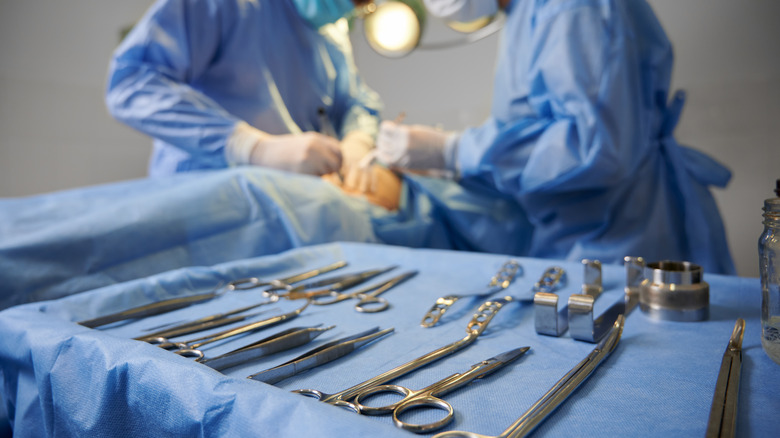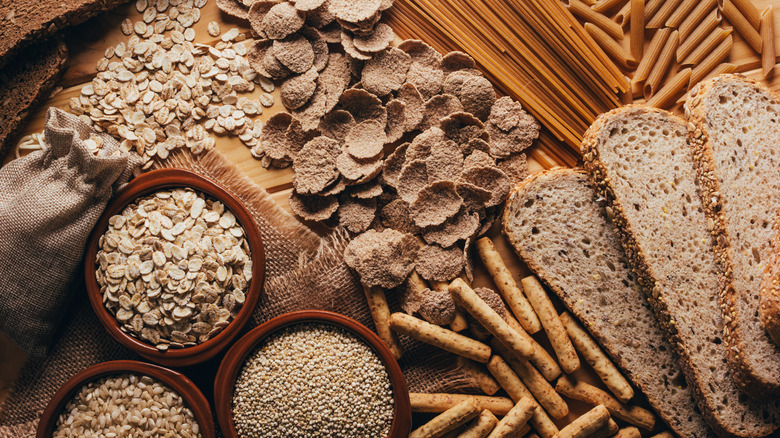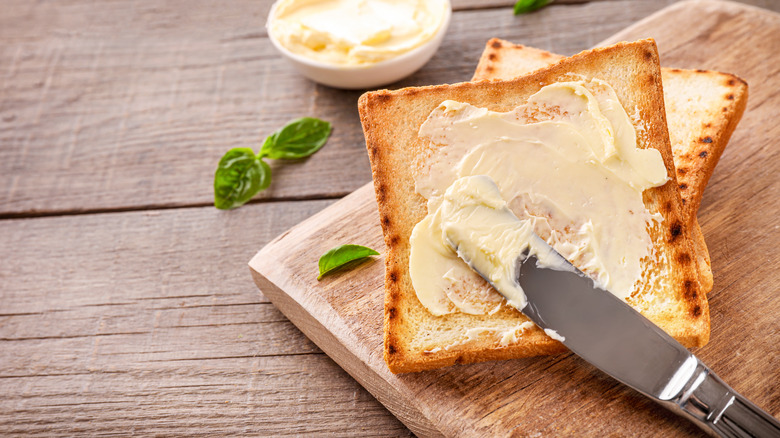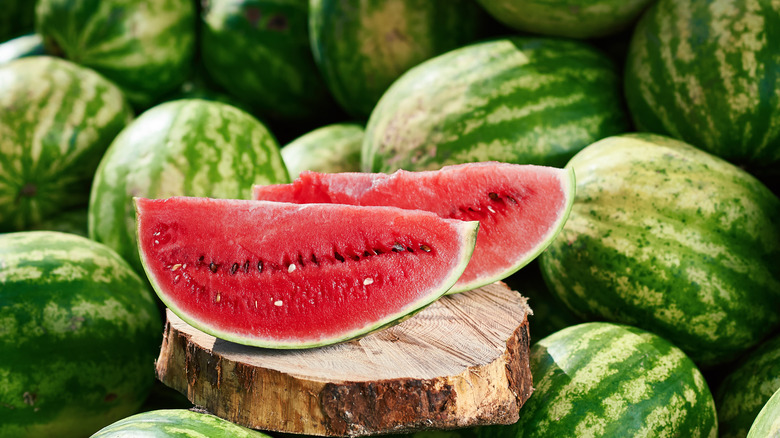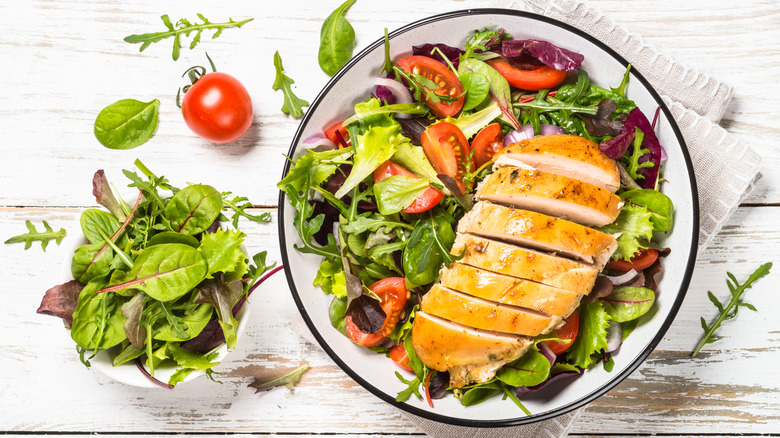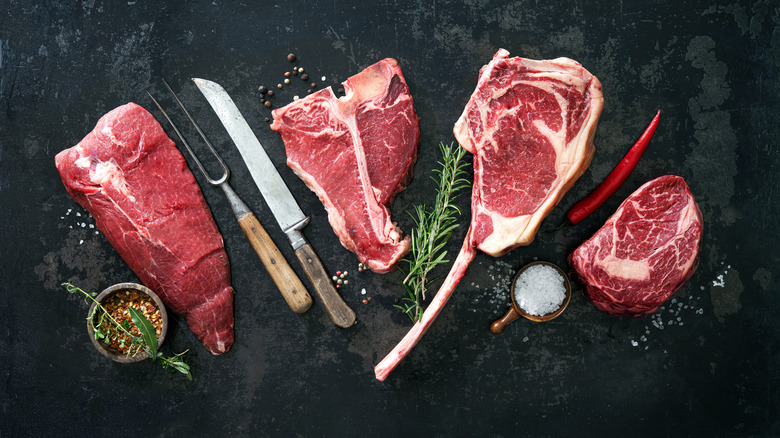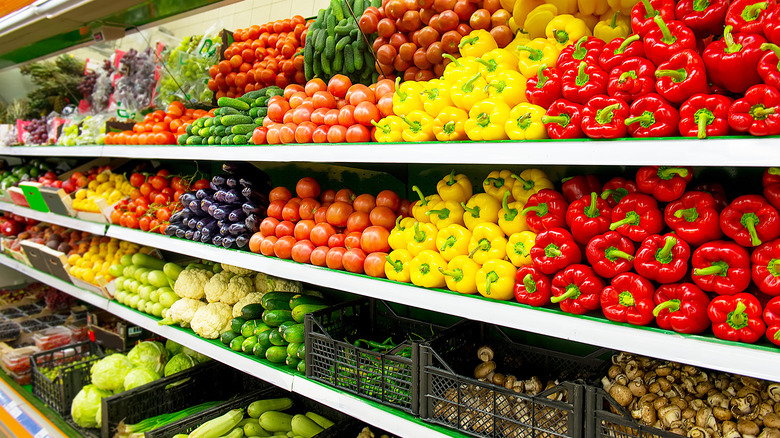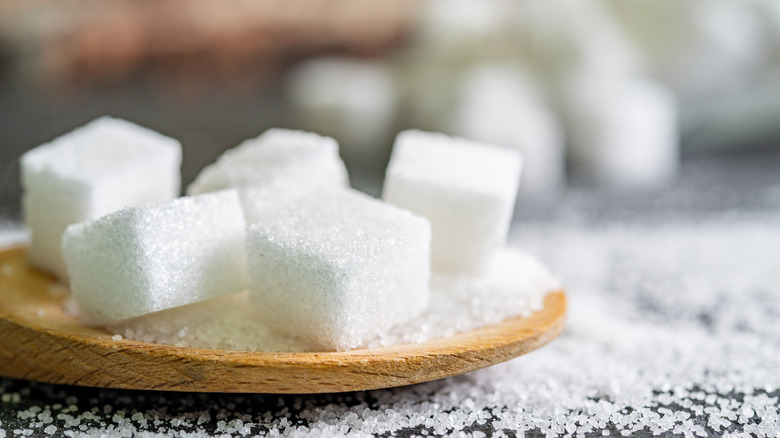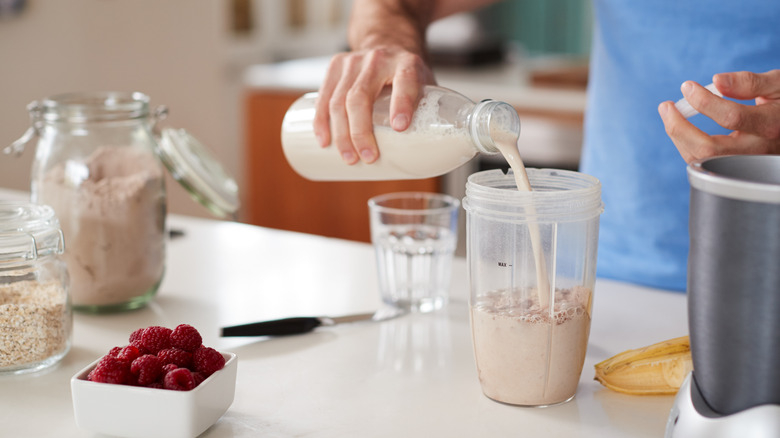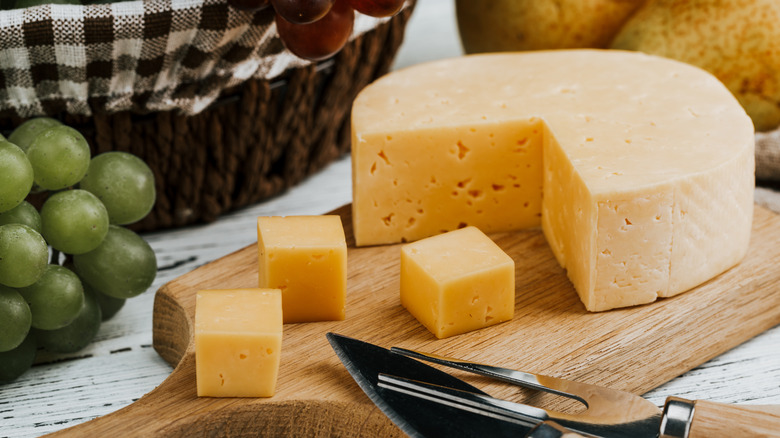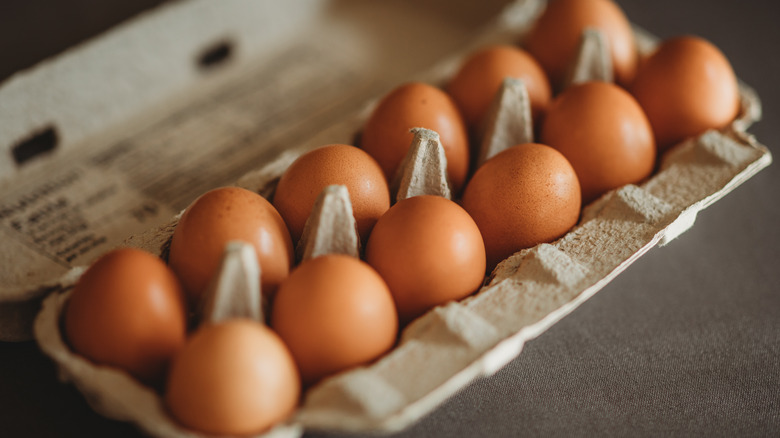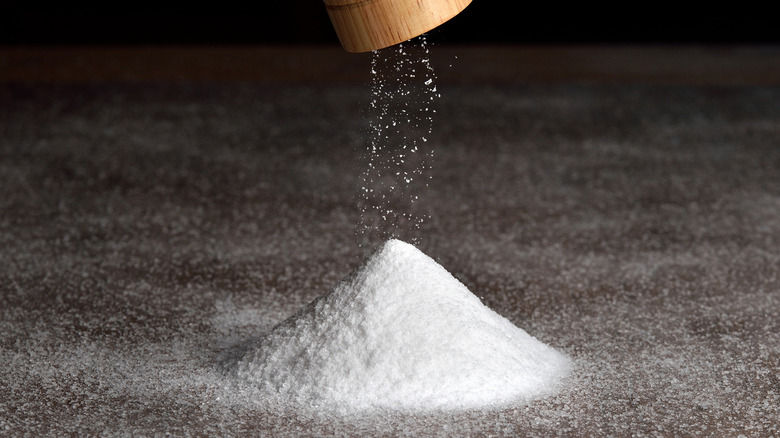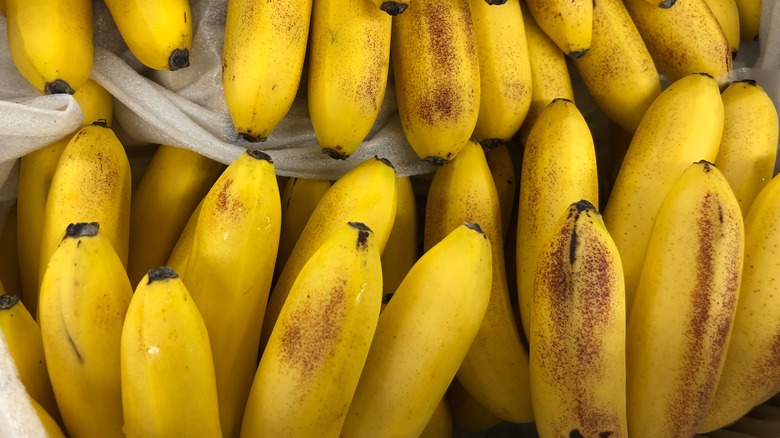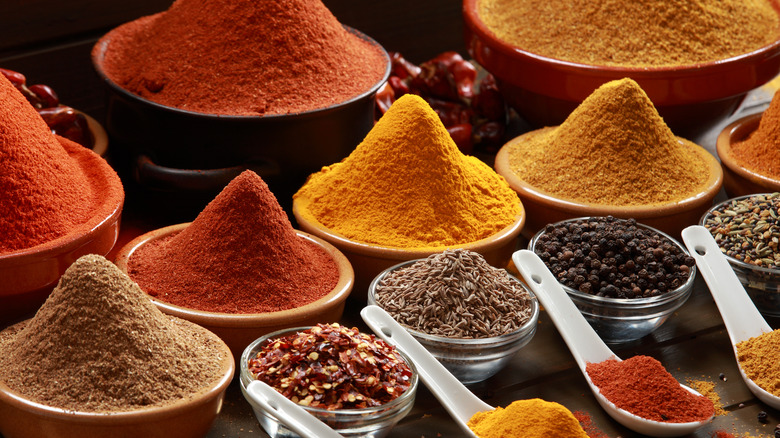7 Foods To Eat After Surgery And 7 To Avoid
Having surgery is a significant moment in any person's life. And while the scale of surgery can vary enormously, no matter how little or large your surgical procedure is, it's vital that you consider your aftercare carefully. What you eat following surgery is a massive part of this — although doctors typically provide you with a lot of information on how to eat post-operation, it's easy to slip back into your old dietary habits pretty fast.
But your food choices after surgery can have a big impact on your recovery, not only in the crucial first few days when you may have to follow specific dietary guidelines but also beyond that, as Dr. Jeffery Campsen states in an interview with University of Utah Health. And there are a wealth of foods that can be beneficial to include in your diet when you're on the road to full health, as well as many foods that should be avoided until you're feeling yourself again. Let's take a look at some of the foods to eat and avoid after your procedure.
Whole grains are a good choice
Talk to any nutritionist about the best foods to include in a healthy diet, and whole grains will be high on the list. Whole grains are loaded with fiber and can help with reducing the risk of heart disease, and increasing satiety (per the Mayo Clinic). And after surgery, whole grains not only help to bolster nutrition, but their fiber content can also improve bowel function, which can be impacted following an operation.
As WebMD states, constipation can be a common occurrence after surgery. The fiber present in whole grains can help ease symptoms of constipation, with both soluble and insoluble fiber helping to move stools through your intestines with more ease (per Everyday Health). After surgery, eating foods containing bran can be a great option, according to WebMD, as well as whole-grain cereals fortified with fiber. While it's possible to top up your fiber intake with fiber supplements, Dr. Donald Novey, Advocate Medical Group, told Everyday Health that it's always better to obtain your fiber from whole foods.
Avoid processed grains
When it comes to constipation, there are foods that help and food that hinder. In a post-surgery setting, it's "quite common, even expected, for patients to be constipated immediately after surgery," says Dr. Jemiel Nejim, anesthesiologist at Hospital for Special Surgery. So, avoiding foods that can cause your intestines to have a little more trouble passing stool through it is vital (via Single Care).
This is why, after surgery, processed grains may be better left out of your meals. Processed grains can be stripped of fiber during their preparation process, leaving them much lower in fiber than their whole-grain siblings, as Healthline states. This is bad news for people who experience constipation, as fiber is a key element in helping your fecal matter pass easily and regularly.
Opting for whole-grain alternatives to the processed grains you might normally eat can help. It's also important to keep in mind that the type of surgery you have may affect the length and severity of constipation you experience, which is something to consider when you're planning your post-operation meals. As Nejim says, "Surgeries that last longer in duration tend to be associated with a higher predisposition to constipation." The type of anesthesia used can also be a factor. Make sure you check with your doctor about the likelihood of constipation after surgery, and how your diet should be adjusted accordingly.
Watermelon is an excellent way to go
It's quite easy to assume that watermelon, with its sweet nature and high-water content, isn't as nutritious as other fruits out there. But after surgery, watermelon can be one of the best things you can eat, because of its hydrating qualities, among other benefits. Maintaining proper hydration is important all the time, but especially after surgery, as Desert West Surgery discusses. Not only does hydration help to aid proper recovery and reduce the risk of infection, but it also helps to rid your body of the residue from any anesthetic used.
This is where watermelon comes in. Watermelon is composed of more than 90% water (hence the name, watermelon), according to Proactive Health Labs, meaning that eating it will help boost your water intake enormously. And not only that but watermelon's high vitamin C content can help wounds heal faster, which could be a huge aid in post-surgery recovery. Watermelon is also chock-full of other vitamins and minerals, contains essential anti-inflammatory components such as lycopene, and could help reduce muscle soreness — all of which are useful in helping you get back to fighting form.
You shouldn't drink alcohol until you're recovered
So, you've come out of surgery, and you're feeling surprisingly good. Surely a drink can't hurt, right? Well, we're here to tell you that there are some very good reasons why your doctor would rather you didn't drink alcohol following surgery until you're fully recovered. To start, alcohol, as a diuretic, can have a "dehydrating effect on the body," as Medical News Today states. This can cause problems in your maintenance of proper hydration post-surgery, which is essential for the recovery process (per Desert West Surgery).
Aside from dehydrating you, drinking alcohol after surgery could be hugely dangerous if you've been prescribed pain medication. "Medications from the opioid drug class, such as Percocet, oxycodone or tramadol, are a cornerstone foundation in managing postoperative pain," says Inara Nejim, Hospital for Special Surgery's clinical pharmacist (via Single Care). Mixing alcohol with opioids can increase the likelihood of negative side effects, and even put you at risk of falling into a coma, says American Addiction Centers. It's best to stay off the booze until your doctor gives you the all-clear.
Chicken breast is a healthy choice
Chicken breast is a staple of kitchens across the world. And if you've got some in your own fridge post-surgery, you're in luck, as it's a great food to prioritize during recovery. Lean protein after surgery is essential to your body's recovery, according to The Portland Clinic. Consuming enough protein after a procedure will help your body perform all of the jobs it needs to, from creating antibodies to keep infection at bay, to helping tissue recovery and scar formation.
And for lean protein sources, it doesn't get much leaner than chicken breast. Roughly 85 grams of chicken breast will provide you with 26 grams of protein, and about 2.7 grams of fat, the USDA states. Other types of lean poultry, and fish and seafood, can also be nutritious choices for lean protein, as well as beans, legumes, tofu, and tempeh for meat-free options.
Hold off on red meat
While protein is an excellent choice to include in your diet after surgery, not all protein is created equally. And when it comes to red meat, it might be best to leave it off the menu while you're recovering. Red meat tends to have higher saturated fat levels than other protein sources, as the American Heart Association discusses. And aside from the other issues that a diet high in saturated fat can contribute to, this saturated fat can also be problematic in a post-op setting. This is because the saturated fat in red meat can contribute to constipation, a common side effect of surgery, according to Verywell Health. Leaving it off the menu and prioritizing lean protein sources and high-fiber options can help to ease constipation.
There are also very good reasons why red meat should be avoided — not just after surgery — but around the procedure too. Having higher cholesterol levels, which can be common in diets with high saturated fat intake, may also cause your surgery outcome to be worse and increase the likelihood of further procedures, according to research discussed in Rheumatology Network. All the more reason to keep it lean.
Get plenty of vegetables
Considering that eating vegetables regularly is one of the cardinal rules of good nutrition, it probably comes as little surprise that vegetables are going to be good for your body after surgery too. And sure enough, making vegetables a staple of your diet post-surgery will help your recovery to no end, not only because of their frequently high-fiber nature but thanks to their vitamin and mineral content as well, says North Central Surgical Center.
Each vitamin and mineral has a specific function when it comes to post-surgery recovery, but getting as many as possible from vegetable sources will help maximize your healing. Vitamins C and A, which help wounds heal faster, can be found in leafy greens, potatoes, sweet potatoes, and bell peppers, North Central Surgical Center explains. Leafy greens are also an excellent source of vitamin K, which helps your blood clot effectively, speeding up the healing process. If you're a mushroom lover, vitamin D, which helps to keep your bones strong and immune system healthy — reducing the risk of illness post-surgery — can be obtained from some mushrooms, according to Medical News Today.
Excessive sugar won't do you much good
After surgery, you might be tempted to treat yourself with a few sugary treats. Hey, we do not blame you on that one. But trying to avoid too much sugar during recovery from surgery is a wise choice — even more so for specific surgical procedures around certain body parts. For patients who undergo abdominal surgery, for example, it's useful to avoid foods that are too high in sugar, as Rogel Cancer Center states. For orthopedic surgeries, too, it's advisable to keep your post-procedure diet lower in sugar, as the depletion of nutrients that it can cause from your body can also cause your bones to take longer healing (per Proliance Orthopedic Associates).
If you're diabetic, avoiding excessive sugar after surgery is particularly important to keep your blood sugar in check, says Hamilton Health Care System. Keeping your blood sugar low, between 80-130 milligrams per deciliter (mg/dL), is vital to keep your healing steady and to manage the risk of infection after a surgical procedure. It's important to check your blood sugar several times a day for at least a month after surgery and to notify your doctor if your blood sugar becomes too high.
Protein shakes are building blocks
It might not be your highest priority to think about your sweet gym gains post-surgery, but don't worry: Protein shakes or smoothies are for more than just your bicep size, especially when you're in recovery from a surgical procedure. The protein in these shakes supplies your body with the all-important building blocks for wound repair, as well as helping to fight infection, according to University of Michigan Health.
And as protein shakes are used to help people increase their muscle mass, it only stands to reason that shakes can result in "reduced muscle soreness" after the tissue is damaged, as they've been shown to do in a study published in Sports Medicine. And not only can protein shakes help speed the healing process (as well as being easy to consume, should you have trouble eating more substantial food following a surgical procedure), but they can also help to keep your body in shape while you recover. According to a study published in Nutrition, supplementing with protein after bariatric surgery helped participants maintain their muscle mass during recovery, in addition to "enhancing loss of body fat mass," the study's authors wrote.
Dairy products can cause upset stomach
If you're a cheese fiend (which we definitely are), you might find this one difficult to swallow. But when it comes to regular dairy products, it might be best to keep them out of your diet post-surgery. That's not to say that dairy doesn't have a lot going for it as a food, particularly when it comes to recovery: As regular dairy products are generally high in protein, they can offer some advantages during the healing process by way of providing the body with building blocks for recovery, according to Verywell Health.
However, as Verywell Health also states, eating standard dairy products can cause stomach upset for some folks post-surgery. Certain dairy products, like cheese, may also contribute to constipation after a surgical procedure. Additionally, dairy may contribute to lung secretions in certain individuals, which may be problematic if you have a chronic cough during recovery. Substituting your regular dairy products with low-fat alternatives may help to mitigate some of these risks, or alternatively, you could leave dairy off the menu altogether until you're back in full health.
Eggs pack the power
It's hard to underestimate the nutritional power of an egg. And that's good news for people post-surgery, because if you've got eggs on the menu, you have access to a wealth of protein, vitamins, minerals, and other nutrients that keep your body recovering properly, per WebMD. What is also particularly useful for surgery recovery are the carotenoids in eggs that can help to bolster the immune system and help fight disease, reducing the risk of post-surgery infection and helping to expedite healing.
Additionally, the zinc in eggs can be a powerful tool in your recuperation. As well as helping to support the immune system (via Healthline), zinc may also help the body repair itself after surgery. According to a study published in Cureus, zinc supplementation after neurological surgery has been seen to result in "overwhelming success" in preventing delayed wound healing and helping things to heal. While the study indicated further research is needed to determine exactly how and to what extent zinc can help wound healing, getting a little more of it through eggs is probably no bad thing.
Too much salt can cause lots of problems
It's generally recommended to avoid excess salt in most situations. Having too much salt can not only cause your bones to weaken over time, but can also increase your risk of stroke, cardiovascular disease, and increase blood pressure, as the Harvard T. H. Chan School of Public Health explains.
And when you're in rehab from surgery, avoiding excess salt becomes even more important. Too much salt can lead to increased swelling after surgery, because excess sodium can cause fluid retention, according to The Aesthetic Surgery Centre. As well as causing you to hold on to fluids, sodium can also, strangely, do the opposite thing, with a diuretic effect that can cause you to become dehydrated, at a time when you really need as many fluids as possible to help your recovery. As The Aesthetic Surgery Centre indicates, this doesn't mean you should cut out salt entirely. But avoid adding too much salt to your food — and try not to go for convenient food items off the shelf, which are generally loaded with sodium, like prepackaged meals, canned soups, and some types of snacks.
Bananas are golden
Just when you think your love affair with the nutritional benefits of bananas is over, you discover yet another major reason to enjoy them. And lo and behold, when it comes to surgery recovery, bananas are one of the best things you can include in your diet. A large part of this is thanks to their ability to help keep your stomach settled and combat nausea, as Verywell Health points out.
Nausea after surgery can be a common problem, with roughly 30% of all people experiencing nausea and vomiting following an operation, according to a study published in the Annals of Palliative Medicine. As well as eating bananas, and other relatively bland foods, trying to eat smaller meals frequently can also help you manage nausea after a procedure, says UCLA Health. Eating slowly, staying upright after eating, and avoiding food that's too hot can also reduce nausea — also, trying to avoid eating beyond the point you feel full will stop you from experiencing further discomfort.
Spicy food can irritate your stomach
You may love spicy food 99% of the time, but in the period when you're recovering from surgery, and particularly specific types of surgery, it's likely to be a different story. While spicy food can taste delicious, the powerful flavorings that cause their heat also act as an irritant, according to Flowers Bariatric Center. For people who've undergone bariatric surgery (or any surgery that involves the stomach or intestines), this irritation may prove difficult for your body to deal with and could cause serious discomfort.
But, while you may think this means you're faced with the prospect of tasteless food until you're completely healed, you don't have to omit all spice — just be wary of going overboard, and only add a tiny bit at a time, keeping it out of your food entirely if you're worried about the effects. Adding dairy products like yogurt to spicy foods can also help take the sting out, and keep your stomach as settled as possible during the crucial recovery period.

